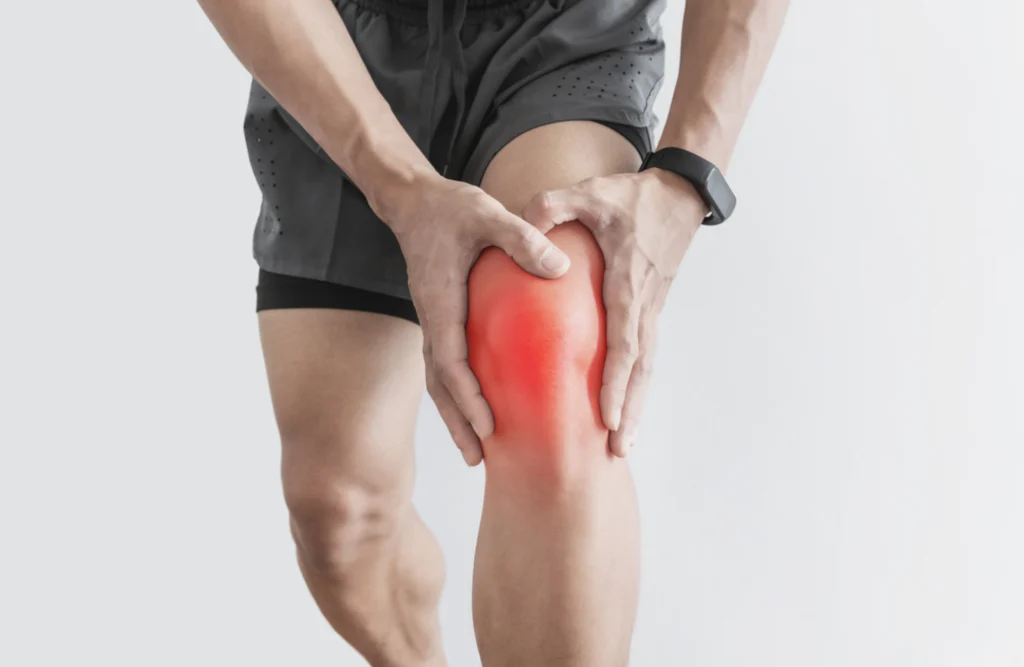Knee pain can arise from various causes, affecting people of all ages. Here are some of the main reasons:
- Injuries: Acute injuries such as ligament tears (ACL, MCL), meniscus tears, and fractures can cause significant knee pain. These injuries are often due to sports activities, accidents, or sudden movements.
- Arthritis: Osteoarthritis, rheumatoid arthritis, and other types of arthritis can lead to chronic knee pain. Osteoarthritis, the most common type, results from the wear and tear of the knee joint over time, leading to pain and stiffness.
- Tendinitis: Inflammation of the tendons, particularly the patellar tendon, often causes pain in the front of the knee. This condition, known as tendinitis, is common among runners, skiers, and cyclists.
- Bursitis: Inflammation of the bursae, small fluid-filled sacs that cushion the knee joint, can lead to pain. Bursitis often results from repetitive activities that put pressure on the knee.
- Mechanical Problems: Issues such as a dislocated kneecap, loose body (fragment of bone or cartilage floating in the joint), or iliotibial band syndrome (tightness of the tissue running from the hip to the knee) can cause knee pain.
- Infections: Knee infections can cause pain, swelling, and redness. Infections can occur due to injuries or surgeries.
For effective diagnosis and treatment, visiting a reputable pain management clinic like Foundation Pain & Spine PLLC can provide comprehensive care and personalized treatment plans.
How to identify the reason of knee pain
Identifying the cause of knee pain involves several steps. Here’s a simple guide:
- Medical History: Discuss your symptoms with a healthcare provider. They will ask about the onset of the pain, its location, intensity, and any activities or injuries that might have triggered it.
- Physical Examination: The doctor will examine your knee for signs of swelling, redness, warmth, and tenderness. They may also assess your knee’s range of motion and stability.
- Imaging Tests: X-rays can reveal bone fractures and degenerative joint diseases like osteoarthritis. MRI scans provide detailed images of soft tissues, including ligaments, tendons, and cartilage, helping to identify tears or other injuries.
- Lab Tests: Blood tests can detect infections, gout, and other conditions that might cause knee pain. If there’s swelling, fluid might be drawn from the knee for analysis.
- Symptom Tracking: Keeping a diary of your symptoms can help. Note when the pain occurs, its severity, and any activities that worsen or relieve it. This information can assist the doctor in diagnosing the problem.
- Special Tests: Sometimes, special maneuvers or stress tests are performed to diagnose specific conditions like ligament tears or meniscal injuries.
For an accurate diagnosis and effective treatment, consulting a professional at a pain management clinic like Foundation Pain & Spine PLLC can provide a comprehensive evaluation and personalized care plan.
How is knee pain usually treated
Knee pain treatment varies based on the underlying cause and severity. Here are some common approaches:
- Rest and Activity Modification: Limiting activities that worsen the pain can help reduce symptoms. Sometimes, taking a break from high-impact activities allows the knee to heal.
- Ice and Heat Therapy: Applying ice packs can reduce swelling and numb the pain, while heat packs can help relax muscles and improve blood flow.
- Medications: Over-the-counter pain relievers like ibuprofen or acetaminophen can alleviate pain and reduce inflammation. In more severe cases, doctors might prescribe stronger medications or corticosteroid injections.
- Physical Therapy: A physical therapist can design a program of exercises to strengthen the muscles around the knee, improve flexibility, and increase range of motion. This can help alleviate pain and prevent future injuries.
- Supportive Devices: Knee braces or orthotic inserts can provide additional support and reduce stress on the knee joint.
- Weight Management: Maintaining a healthy weight can reduce the strain on your knees, which is particularly beneficial for those with osteoarthritis.
- Surgery: In cases where conservative treatments are ineffective, surgical options such as arthroscopy, partial knee replacement, or total knee replacement may be considered.
For personalized treatment, visiting a pain management clinic like Foundation Pain & Spine PLLC can provide a comprehensive approach to managing and treating knee pain.
Foundation Pain & Spine PLLC
8390 Lyndon B Johnson Fwy Suite 500, Dallas, TX 75243, United States
(469) 214-5735


